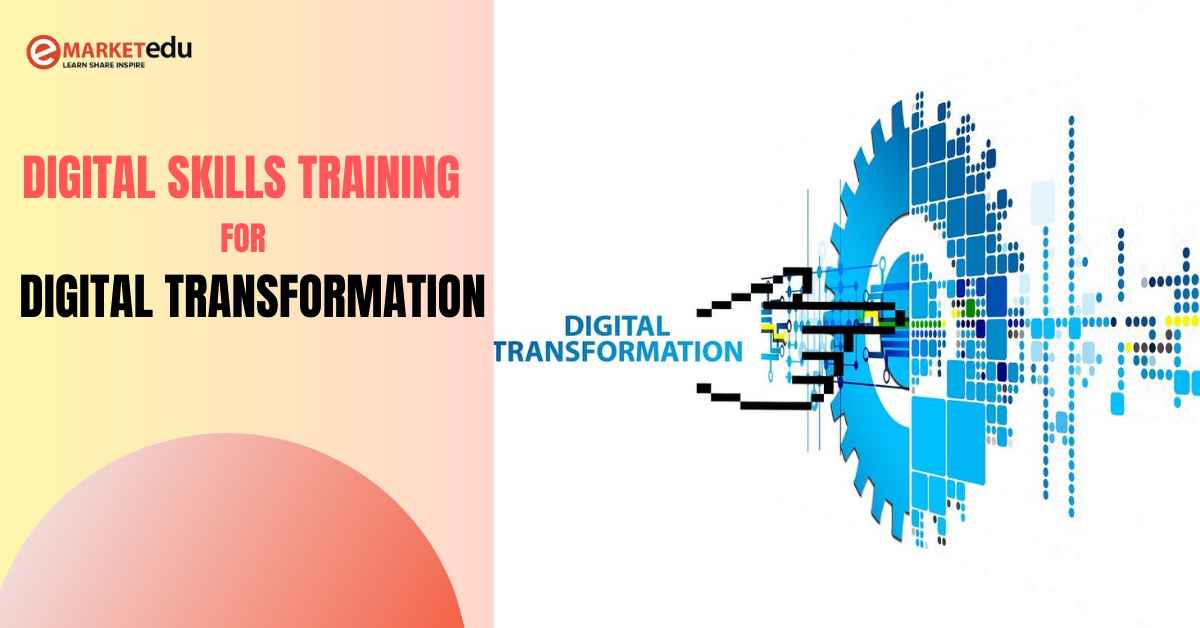Table of Contents
ToggleLeadership in Digital Transformation: Empower Through Digital Skills Training
“At least 40% of all businesses will die in the next 10 years… if they don’t figure out how to change their entire company to accommodate new technologies.” — John Chambers, Cisco
In today’s rapidly evolving business landscape, digital transformation is not just a buzzword; it’s crucial for organizations seeking growth, efficiency, and competitiveness. At the heart of this transformation is integrating digital technologies into every aspect of a business, fundamentally changing how organizations operate and deliver value to customers. It involves adapting digital tools, data analytics, and emerging technologies to enhance operational efficiency, foster innovation, and build a sustainable competitive advantage. As digital transformation reshapes industries, managers and executives must develop the skills and understanding necessary to leverage these technologies effectively.
The Importance of Digital Skills for Leadership in Digital Transformation
Digital transformation is more than just implementing new tools or technologies. It represents a holistic shift in how businesses think, act, and deliver value. This transformation requires a mindset that embraces continuous learning, agility, and innovation for managers and executives. Digital skills training empowers leadership in digital transformation, giving them the confidence and capability to:
Make Informed Decisions: Digital tools and data analytics offer unprecedented insights into market trends, customer behavior, and internal processes. Leaders with digital skills can better understand these insights, driving more informed and strategic decision-making.
Enhance Operational Efficiency: Integrating digital technologies streamlines operations, reduces manual errors and improves overall efficiency. Digital-savvy leaders can identify opportunities to automate repetitive tasks, optimize workflows, and reduce costs, leading to a more agile and responsive organization.
Foster Innovation and Growth: Understanding emerging technologies, such as artificial intelligence (AI), machine learning (ML), and blockchain, enables leadership in digital transformation to explore new business models and revenue streams. With the right digital skills, they can lead their teams in developing innovative solutions that align with market demands.
Build a Digital Culture: A digitally competent leadership team is essential for fostering a culture of innovation, collaboration, and agility. When leaders demonstrate proficiency in digital tools, they set a precedent for the entire organization, encouraging employees to embrace technology and continuous learning.
Critical Areas of Corporate Training Programs Required for Leadership Role Digital Transformation
To truly harness the power of digital transformation, managers and executives need to focus on three core areas: digital tools, data analytics, and emerging technologies.
- Understanding and Implementing Digital Tools
Digital tools are the foundation of any digital transformation strategy. From customer relationship management (CRM) software to project management platforms, are integral part of digital transformation training for businesses. These tools facilitate communication, collaboration, and efficiency across the organization. Training in digital tools should cover the following:
Digital Collaboration Platforms: Tools like Microsoft Teams, Slack, and Zoom have become essential for remote work and collaboration. Leaders must understand how to utilize these tools to manage teams, communicate effectively, and foster a collaborative environment through technology integration in business.
Automation and Workflow Tools: Platforms like Zapier, Trello, or Monday.com automate repetitive tasks and streamline project management. Understanding these tools enables managers to reduce manual workload, enhance productivity, and focus on more strategic tasks.
Customer Experience Tools: Tools like Salesforce, HubSpot, and Zendesk offer insights into customer interactions, helping leaders make data-driven decisions to improve customer satisfaction and loyalty.
- Data Analytics and Interpretation: Turn Your Data into Insights and use for the betterment of the Business
Data is the new oil; leaders must know how to extract, interpret, and apply this valuable resource.
Understanding Data Sources: Leadership in digital transformation must be familiar with various data sources, such as social media, sales data, and customer feedback, and understand how to leverage these sources for decision-making.
Data Visualization Tools: Tools like Tableau, Power BI, and Google Data Studio help convert complex data into easy-to-understand visualizations. Leaders should learn to use these tools to communicate insights effectively to stakeholders.
Predictive Analytics: Basic knowledge of AI and ML can empower leaders to use predictive analytics to foresee market trends, customer behavior, and potential risks, helping them make proactive decisions.
- Use of Emerging Technologies: Stay Ahead of the Competition
Emerging technologies such as AI, blockchain, the Internet of Things (IoT), and 5G are reshaping industries and creating new growth opportunities through technology integration in business. Digital transformation training should cover:
Artificial Intelligence and Machine Learning: Understanding the basics of AI and ML helps leaders identify areas where these technologies can be applied to optimize processes, enhance customer experiences, or develop new products.
Blockchain and Digital Ledger Technologies: Knowledge of blockchain can give leaders a new perspective on data security, transparency, and process optimization.
Internet of Things (IoT): Training on IoT can help leaders understand how connected devices can streamline operations, improve asset management, and create new customer experiences.

Suggested Steps to Digital Transformation Pathway
To achieve digital transformation, organizations must take a structured approach to digital skills training:
Assess Current Skill Levels: Conduct a skills gap analysis to identify areas where managers and executives need training. This assessment will help tailor training programs to meet specific organizational needs.
Develop a Tailored Digital Business Training Program: Create a comprehensive digital business training program that covers essential digital tools, data analytics, and emerging technologies. Incorporate practical exercises, real-world case studies, and hands-on workshops to ensure an interactive learning experience.
Promote Continuous Learning: Encourage leaders to stay updated on the latest digital trends and tools through webinars, online courses, and industry conferences. A culture of nonstop learning makes sure that the business entity remains swift, adaptable, and responsive to market or business environment changes.
Measure and Adjust: Regularly evaluate the effectiveness of the training program through feedback, assessments, and performance metrics. Use these insights to refine the program and address any emerging gaps.
In conclusion digital transformation is a journey that requires commitment, continuous learning, and the right skills. For managers and executives, digital skills training is not just an option but a critical investment. By understanding and implementing digital tools, leveraging data analytics, and staying ahead of emerging technologies, leadership in digital transformation can drive strategic advantage, ensuring their organization remains competitive and strategic in the digital age.
Empowering leadership with digital skills is not just about technology—it’s about preparing for the future and creating a sustainable, agile, and innovative organization that can adapt and thrive in a rapidly changing world.
At eMarketEdu, we offer tailor-made digital skills training programs designed to address the specific requirements of corporate teams. Contact us today to learn more about how we can help your team achieve success!
Also read our most loved posts related to – Corporate Digital Marketing Training:
Corporate Digital Marketing Training Program Best Practices
AI in Digital Marketing: Transforming Corporate Strategies and Growth
Voice Search in Digital Marketing is Real: Optimize for Voice Search






